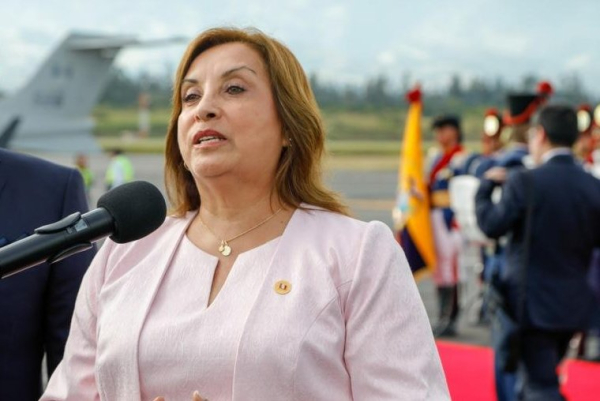

Public trust in institutions continues to erode. According to polls conducted in June, only 4% of Peruvians approve of President Dina Boluarte’s performance. File photo by Santiago Fernandez/EPA
Peru’s Congress has passed a controversial law granting “humanitarian” amnesty to nearly 900 military and police officers convicted or facing charges for serious human rights violations committed between 1980 and 2000 — as long as they were not sentenced for terrorism or corruption and are overage 70.
The law, passed July 9 and widely condemned by human rights groups, would leave more than 150 convictions unpunished and halt more than 600 ongoing cases. Analysts say it adds to a growing list of congressional measures that have deepened Peru’s institutional crisis and eroded its democracy.
“Democracy in Peru is being undermined from within — by the very democratic institutions that have failed to resolve the country’s longstanding problems,” said Max Hernández, executive secretary of the National Accord, a dialogue forum that brings together the government, political parties and civil society organizations to establish long-term state policies for sustainable development.
“Never before in Peru have the branches of government been so weakened and at odds with each other as they are now,” political analyst Coco Salazar said. “The executive branch is in conflict with the judiciary, the judiciary with Congress and Congress with the executive. All branches are at odds and trying to undermine one another.
“Today, for example, Congress filed a new constitutional complaint against the attorney general. Yesterday, President Dina Boluarte convened the National Security Council to address public safety issues and invited everyone — except the attorney general’s office, which is a key member of the Council.”
Public trust in institutions continues to erode. According to polls conducted in June, only 4% of Peruvians approve of Boluarte’s performance. Support for Congress is even lower — just 2% approve of its work, while 95% disapprove.
The attorney general’s office reports that 67 of Peru’s 130 lawmakers being investigated for crimes that include corruption, organized crime, money laundering, aggravated collusion and homicide.
The accused come from nearly every political party. Some, like Luis Picón of Podemos Perú and Alejandro Soto of APP, face dozens of open case files for a range of alleged offenses.
But analysts say the greater concern is not just the number of lawmakers under investigation — it’s how Congress is using its power to weaken oversight, protect the accused and guarantee impunity.
That pattern mirrors what happened in Ecuador between 2018 and 2022: a weakened state, criminal infiltration of politics and the dismantling of judicial institutions. As a result, the country went from having one of the lowest homicide rates in South America to leading the region in 2024, with more than 8,000 killings in a single year, according to official data.
Between 2023 and April, Peru’s Congress approved 34 laws and legislative measures aimed at weakening the rule of law, particularly the state’s capacity to combat corruption and organized crime, according to a recent report by Human Rights Watch.
“Ideally, Congress should be made up of the country’s best technical and political minds to help build the nation and uphold democracy. That doesn’t happen in Peru because traditional political parties no longer exist,” Salazar said.
A combination of long-term decline, corruption scandals and a lack of internal renewal has contributed to the collapse of political parties..
In the 1990s, the regime of Alberto Fujimori promoted an anti-party narrative that weakened the political system. That was followed by high-profile judicial scandals involving prominent figures such as former President Alan García, along with the parties’ failure to adapt to new social demands.
Amid institutional weakness, so-called “rental parties” emerged — temporary electoral platforms with no ideology or structure. Electoral rules were loosened, lowering the bar for candidate and party registration and fueling fragmentation and the rise of outsiders and media personalities with no institutional ties.
Today, Congress has been taken over by groups representing specific economic interests, such as those tied to illegal mining, who lobby to block regulation, Salazar said. He added that this has contributed to political instability and the growing reach of organized crime in public life.
“One of the issues we’re working on in the National Accord is how to preserve democracy. I believe we need to trust young people who are thinking about how to prevent corruption and strengthen political participation — something that has been neglected in recent years,” Hernández said.
Peru is to hold presidential and congressional elections in April 2026, with at least 43 presidential hopefuls and nearly 15,000 congressional candidates — a reflection of the country’s deep political fragmentation.